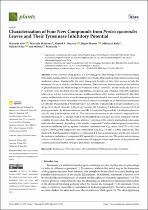| dc.description.abstract | Protea cynaroides (king protea) is a flowering plant that belongs to the Proteaceae family. This multi-stemmed shrub is the national flower of South Africa and has important economic and medicinal values. Traditionally, the main therapeutic benefits of this plant species include the treatment of cancer, bladder, and kidney ailments. There are very limited reports on the isolation of phytochemicals and their biological evaluation from P. cynaroides. In this study, the leaves of P. cynaroides were air-dried at room temperature, powdered, and extracted with 80% methanol followed by solvent fractionation (hexane, dichloromethane, ethyl acetate, and butanol). The ethyl acetate and butanol extracts were chromatographed and afforded four new (1–4) and four known (5–8) compounds, whose structures were characterized accordingly as 3,4-bis(4-hydroxybenzoyl)-1,5-anhydro-D-glucitol (1), 4-hydroxybenzoyl-1,5-anhydro-D-glucitol (2), 2-(hydroxymethyl)-4-oxo-4H-pyran-3-yl-6-O-benzoate-β-D-glucopyranoside (3), 3-hydroxy-7,8-dihydro-β-ionone 3-O-β-D-glucopyranoside (4), 4-hydroxybenzoic acid (5), 1,5-anhydro-D-glucitol (6), 3,4-dihydroxybenzoic acid (7), and 3-hydroxykojic acid (8). | en_US |

